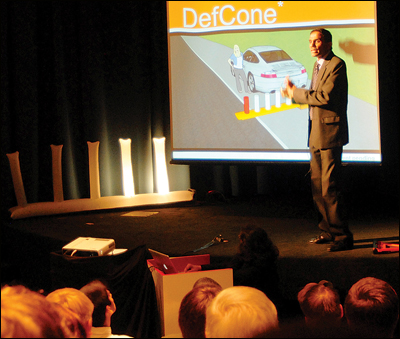A low-tech safety device for drivers stranded on roadsides at night has been designed by a Vanderbilt engineering professor.
DefCone is a series of five inflatable, illuminated cylinders vertically aligned to form a 2-foot-high barrier roughly the width of a car. The cylinders’ LED lights blink at intervals.

Bharat Bhuva, professor of electrical engineering and computer science, has just launched Alert/Divert Systems to make DefCone, a product he hopes will replace the small, orange triangles drivers use to alert traffic to a disabled vehicle stopped at night along the side of a road.
In 2012, many of the 30,000-plus fatalities involved roadside repairs Bhuva said in a pitch to investors Aug. 7 during Demo Day at a business accelerator program called autoXLR8R.
Demo Day capped a 13-week boot camp program, housed in Saturn’s former headquarters in Spring Hill, Tenn., for startups looking to gain traction in the automotive industry.
Bhuva compared DefCone to the orange triangles using four performance metrics: minimum visibility (drivers could spot DefCone up to 10 times farther away); reaction distance (drivers took preliminary precautions up to 80% sooner when they saw DefCone); lane changes (22% more drivers gave stranded vehicles a wider berth); and passing speed (drivers reduced their speed by 6%).
To define the business opportunity, Bhuva provided two examples. There are 250 million cars in the U.S. At an estimated $50 per DefCone, capturing even 1% of that market means $125 million in revenue. Or, there are 15 million new cars produced every year—each with its own roadside safety kit. Just 1% of that market equals $7.5 million in sales. At a production cost of under $20 per unit, the gross profit margin nears 70%.
Bhuva said he plans to use investment capital for final design, packaging tweaks and various marketing efforts.
AutoXLR8R was developed by the Southern Middle Tennessee Entrepreneur Centers, one of nine economic accelerators across the state started under Gov. Bill Haslam’s administration.
The startup companies received $20,000 to launch their venture and had access to a network of industry experts. The participants gave partial ownership of their companies — up to 10 percent — in exchange for seed money.
Information in this article first appeared in Forbes (online-Brett Nelson) and in The Daily Herald, Columbia, Tenn. (online-Timothy Hodge)